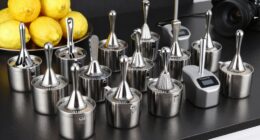Freshly squeezed lemon juice lasts about 3 to 4 days in the fridge after you open it. On the other hand, commercial lemon juice can stay good for 6 to 12 months once opened, especially if you keep it refrigerated. Always check for off odors, color changes, or a loss in flavor to ensure it's still fresh. Want to learn more about storing lemon juice and maximizing its shelf life?
Key Takeaways
- Commercial lemon juice is good for 6 to 12 months after opening when refrigerated.
- Freshly squeezed lemon juice lasts 3 to 4 days in the refrigerator.
- Always store opened lemon juice in the refrigerator to maintain quality.
- Signs of spoilage include off odors, color changes, and diminished flavor.
- For longer storage, consider freezing lemon juice in ice cube trays.

Have you ever wondered how long your lemon juice lasts after you crack open the bottle? You're not alone! Whether you're using it for cooking, cocktails, or just a refreshing drink, knowing the shelf life can save you from potential waste and disappointment.
Once you've opened that bottle, the way you store it plays a crucial role in how long it remains good. When stored properly in the refrigerator, commercial lemon juice can last anywhere from 6 to 12 months. However, if you're using freshly squeezed lemon juice, it's a different story. That typically stays good for just 3 to 4 days when kept in an airtight container in the fridge.
Commercial lemon juice is designed to have a longer shelf life than fresh juice. After you open that bottle, refrigeration is key to maintaining its quality. While it may still be safe to consume for months past the initial opening, you might notice that its effectiveness decreases over time. The flavor could become less vibrant, and the acidity mightn't pack the same punch as it once did.
So, if you've got a bottle sitting in your fridge, it's wise to keep track of when you opened it. Always check for signs of spoilage before using lemon juice that's been opened for a while. If you detect any off odors or notice changes in color, it's best to toss it out. These signs can indicate that your lemon juice is no longer good and could negatively affect your dish or drink.
Even if the expiration date on the bottle suggests it's still safe, your senses can often tell you more than a label can. When you squeeze your own lemons, you should aim to use the juice quickly. Freshly squeezed lemon juice is best enjoyed within a few days. Store it in an airtight container to help preserve its freshness and pop it in the refrigerator right away.
If you're planning to use it later, consider freezing it in ice cube trays and transferring the cubes to a freezer bag. This way, you'll have fresh lemon juice on hand whenever you need it, extending its usability beyond just a couple of days.
Frequently Asked Questions
Does Lemon Juice Go Bad in the Refrigerator?
Yes, lemon juice can go bad in the refrigerator.
Even when stored properly, it may spoil over time due to exposure to air and microorganisms.
You should always check for signs of spoilage, like off odors, color changes, or an unpleasant taste.
If you notice any visible mold or unusual changes, it's best to toss it out.
Keeping the container tightly closed helps prolong its freshness, but it's still not indefinite.
How Do You Know if Lemon Has Gone Bad?
You might think lemon juice lasts forever, but it can spoil.
To know if yours has gone bad, check for visible mold or a darkening color—fresh juice should be light yellow and clear.
If it smells off or tastes bitter instead of zesty, toss it out.
Always trust your senses; any changes in color, smell, or flavor are signs it's no longer safe to consume.
When in doubt, it's best to discard it.
How Long Can You Keep Lemon Water Before It Goes Bad?
You should consume lemon water within 2-3 days when stored in the refrigerator.
If you leave it out at room temperature, it can spoil within 2 hours due to bacteria growth.
Over time, you'll notice changes in taste and smell, indicating it's no longer fresh.
To keep it as fresh as possible, store it in an airtight container and always check for cloudiness or off odors before drinking.
What Bacteria Can Grow in Lemon Juice?
When you open lemon juice, spoilage bacteria like Lactobacillus can start to grow if it's not stored properly.
You might also notice yeast and mold, especially after exposure to air. The high water content in lemon juice creates a perfect environment for these microbes, particularly at room temperature.
Keep an eye out for off smells, strange flavors, or visible mold, as these are signs that the lemon juice has gone bad.
Conclusion
In conclusion, you can enjoy your opened lemon juice for about three to six months when stored properly in the fridge. Remember to check for any changes in color, smell, or taste before using it. By keeping it sealed, by storing it in a cool place, and by using clean utensils, you can extend its freshness. So, stay mindful, stay safe, and savor the zesty flavor in your dishes for longer!
Cindy thoroughly researches juicing trends, techniques, and recipes to provide readers with practical advice and inspiration. Her writing style is accessible, engaging, and designed to make complex concepts easy to understand. Cindy’s dedication to promoting the advantages of juicing shines through her work, empowering readers to make positive changes in their lives through the simple act of juicing.











